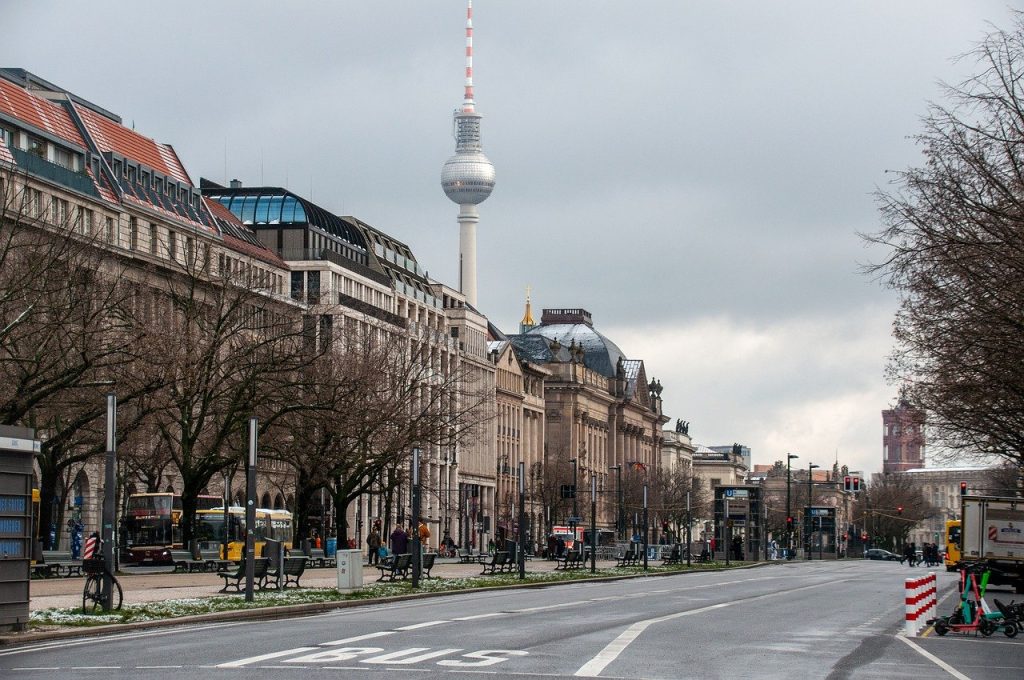If you are reading this, it is likely that you are considering moving to Berlin. A cosmopolitan city par excellence, it attracts many expats, who now account for almost 20% of its population. However, it is important to prepare well before moving abroad. Foyer Global Health offers a comprehensive guide to help you successfully relocate to Berlin, covering everything from neighbourhoods to live in to the cost of living and the job market.
Why move to Berlin?
The advantages
Berlin has:
- A large expat community, including English speakers
- Nearly 170 museums
- More than 2,000 public green spaces
- A well-developed public transport network
- A rich, artistic and cosmopolitan culture
- Rents slightly lower than in other major German cities
Some drawbacks
- If you don’t speak German, it clearly slows down your integration
- Administrative procedures in German may require assistance
- Some neighbourhoods, especially Mitte, are packed with tourists from May to September
Accommodation in Berlin
In Berlin, there are many neighbourhoods to choose from when looking for accommodation, and a wide variety of properties. Studios and apartments are common in the city, and you can find houses on the outskirts.
To make your search easier, there are several German property websites available, such as ImmoScout24.de and Immonet.de.

The best neighbourhoods in Berlin
Berlin offers a wide variety of neighbourhoods in which to settle as an expat, spread across different districts.
- Mitte, the beating heart of Berlin: this district is home to some of the city’s most iconic neighbourhoods and remains one of the most expensive in terms of housing.
- Friedrichshain-Kreuzberg, for a lively lifestyle: these neighbourhoods are an ideal option for those looking for a dynamic and trendy atmosphere.
- Pankow, for a family atmosphere: with its neighbourhoods such as Prenzlauer Berg, Blankenburg, Heinersdorf and Karow, this district is perfect for families.
- Spandau, for a quieter life: located to the west of the city, this neighbourhood offers a good balance between city life and green spaces, ideal for those looking for a more peaceful setting, far from the hustle and bustle of Berlin’s city centre.
The cost of housing in Berlin
The cost of real estate in Berlin is generally lower than in other German cities, including Munich and Hamburg.

For a small apartment in Berlin city centre, the average rental price is 1,260 euros per month. The purchase price is around 7,550 euros per square metre.
Everyday life in Berlin…
…It’s possible to live in Berlin without speaking German!
It is entirely possible to live in Berlin without speaking German, on one condition: you must be proficient in English. In Germany, a large proportion of the population speaks English.
However, we recommend that you learn German to speed up your integration.
This will make your daily interactions easier, open up new professional opportunities and, in time, enable you to obtain German nationality if you wish (which requires at least a B1 level of proficiency in German).

Where life is good
A recent German study reveals that the inhabitants of Berlin have one of the highest levels of life satisfaction in Germany.
Among the main factors cited are the numerous cultural opportunities, the many leisure options offered by the city, as well as the professional opportunities.
Getting around the capital

Berlin has an extremely comprehensive public transport network, comprising 16 suburban railway lines, 10 underground lines, and 200 tram and bus lines. A ticket costs between 3 and 9 euros.
It is worth noting that the city is characterised by its numerous cycle paths. Cycling is an integral part of the urban landscape, and a self-service rental system, Nextbike, makes it easy to take advantage of this!
The cost of living in Berlin
On average, a single person needs a monthly budget of 1,650 euros to live in Berlin, including rent. The cost of living in Berlin is therefore considered lower than in other major German cities. According to the Numbeo 2025 ranking, Berlin is the 6th most expensive city in the country.
This difference can be explained by the fact that the cost of groceries and rent in the eastern federal states is more affordable than in the western federal states.
West Berlin vs East Berlin: income and rents
More than 35 years after the fall of the Berlin Wall, differences still remain in terms of the cost of living and income between the east and west of the city.
On average, the cost of living in the east remains slightly lower, mainly due to lower annual incomes of around 3,000 euros. There are also fewer professional opportunities, given that the majority of large German companies (93%) are located in the West.
This translates into rents that are still slightly lower in some neighbourhoods in the East, although the gap is gradually narrowing as the economic power of the eastern part of Berlin increases.
Focus: The cost of living in Berlin compared to London
Living in London costs on average 39% more than in Berlin. The main difference lies in the cost of housing. In the city centre, a one-bedroom apartment in Berlin costs on average €1,208.81, compared to €2,654.11 in London. The price per square metre is 151.8% higher in London.
It should be noted that, in general, the cost of living in the United Kingdom is higher than in Germany.
Living in Berlin with your family
Children’s education
In Germany, a child’s education begins at the age of six. Before that, they are often sent to the ‘Kita’, the German nursery school.
Working parents who would like more information about childcare for their young children can contact the Youth Office (Jugendamt) in Berlin directly.
There are many English-speaking schools such as the Berlin International School (BIS). It offers the International Baccalaureate (IB) curriculum from Kindergarten through Grade 12, serving a student body representing over 70 nationalities.

Another prominent institution is the John F. Kennedy School (JFKS), a bilingual public school providing education from Kindergarten to Grade 12. Integrating both American and German educational systems, JFKS allows students to pursue either the German Abitur or the American High School Diploma.
Family outings
The family aspect of Berlin is still little known, but it is very much present. Several destinations are ideal for families:
- Zoos, including Berlin Zoo and Tierpark Berlin;
- The city’s many museums, including ANOHA, a museum specially designed for children;
- The Garden of the World, made up of 10 themed gardens.
Working in Berlin
Working conditions for expats

Citizens from an EU member state do not need a visa or work permit to work in Germany. Your only obligation is to register at the residence office (Anmeldung) in Berlin. All you have to do is download the official document, fill it in and send it within two weeks of your arrival.
This will give you:
- a tax number (necessary for working)
- a telephone and internet line
- a bank account, if you wish
The Anmeldung is also necessary to take out health insurance.
Looking for a job in Berlin
It is advisable to find a job in Berlin before moving there. Although it is possible to look for a job on the spot, the process can be tedious, especially if you do not have a good command of the language. It can be difficult to understand job offers written in German.
To find a job in the capital, you can consult specialised sites such as Eurorekruter, Stellenanzeigen and Meinestadt.
What is the average salary in Berlin?
The median salary in Berlin is 3,200 euros net per month. Job offers therefore show one of the highest salaries in the country, but slightly lower than salaries in Munich and Hamburg. By way of comparison, in Hamburg, the average salary is 3,300 euros.
Getting healthcare in Berlin
The medical care available in Germany is among the best in Europe. Berlin is no exception and offers quality care in many health establishments, both private and public. Health insurance is compulsory for living in the country.
Expatriates generally turn to international private insurance, mainly for three reasons:
- Access to high-end and fast healthcare
- International cover, valid in Germany and abroad
- Fully bilingual service, to communicate with the insurer in their native language, particularly in French
